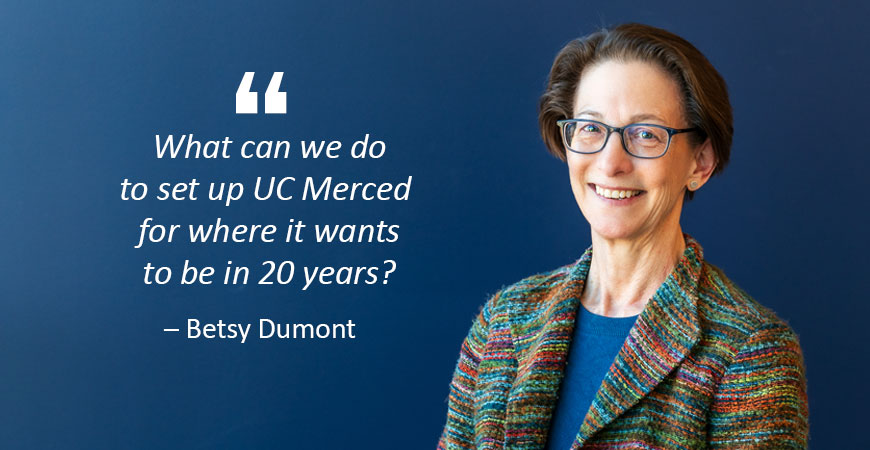
In a thick rainforest in Papua New Guinea, they're tracking bats. Researchers glue radio transmitters to the creatures’ little, furry bodies, then wait. And wait. When a bat flits to another position, the humans sprint through the foliage, stop and take a reading.
It’s 1 a.m. The researchers will do this all night, running from spot to spot, triangulating the bats’ movements. Logging data.
Having a blast.
“It’s just fun, right?” Betsy Dumont said, recounting a moment lived on the way to becoming one of the world’s top bat biologists. “It’s hard and it’s fun.”
(Note: The transmitters eventually fall off, leaving the bats unharmed.)
Dumont has added many things to her resume since that fieldwork in tropical Oceania in the mid-’90s. While continuing to expand her (and, by extension, our) knowledge of the mammalian order chiroptera, she logged 16 years researching, teaching and then rising through academic administration at the University of Massachusetts in Amherst.
Then came a big move across the U.S. to become the School of Natural Sciences dean at the UC’s first new campus in four decades. Since 2017, Dumont has guided the UC Merced school with a personal emphasis on building coalitions, thoughtful change management and transparency.
Along the way, she has continued to feed her passion for ballet, pushing herself through twice-weekly, 75-minute sessions at the Merced Academy of Dance. She helps her husband serve as co-host of one of the sweetest Airbnb cottages you’ll find within an hour’s drive of Yosemite.
And soon – April 1, to be precise – she officially assumes the role of executive vice chancellor and provost. She is the fifth person – and first woman – to hold the permanent position as UC Merced's No. 2 executive leader, its chief academic officer.
“It is a testament to Dr. Dumont’s demonstrated leadership and abilities that, after a rigorous national search, she was the ideal choice for this pivotal position,” Chancellor Juan Sánchez Muñoz said.
Marjorie Zatz has held the position in an interim role since June 2023, taking over after Gregg Camfield stepped down after five years at the job. Dumont takes stewardship of an up-and-rising research institution with more than 320 Senate faculty members, annual research expenditures topping $48 million, and a list of big plans and big challenges.
It’s been a while since Dumont tromped regularly through branches and vines in Ethiopia, Papua New Guinea and Panama to catch flying mammals. Fieldwork opportunities shrank as she assumed leadership roles at UMass, followed by her years as School of Natural Sciences dean. She keeps her hands in it, though. She supports a graduate student on bat research. And once a year, she and fellow bat biologists gather in Belize to exchange findings, catch a few bats and soak in some camaraderie.
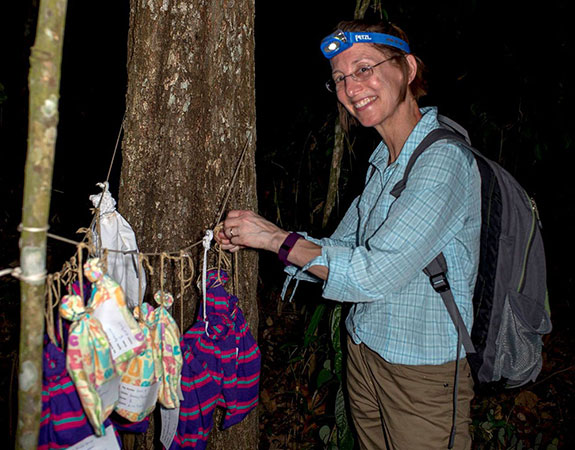
“It's a really wonderful, warm and generous group of scientists. Super supportive. Super helpful,” Dumont said.
She also maintains a cherished connection to Amherst. Members of a book club she joined at UMass continue to meet on Zoom. They dig into the themes of books they all choose to read. Just as important – perhaps more so – they maintain connections.
“We run through a lot of issues in our lives,” said club member Joya Misra, a UMmas provost professor of sociology and public policy. “It’s a lovely place to provide support.” Dumont, she added, is always calm and empathetic.
The club used to begin meetings at 6 p.m. Eastern time. After Dumont came to Merced, members shifted the start to 8 p.m. to accommodate their West Coast friend.
For years, Mark Matsumoto had a front-row seat to Dumont’s leadership style.
“I think Betsy and I have similar philosophies. We don’t try to force our thoughts on everybody,” said the dean emeritus of UC Merced’s School of Engineering. “Instead, we try to help everyone become better versions of themselves.”
“Betsy knows what the issues are and how to approach them,” said Matsumoto, who was on the provost search committee. “She’s given a lot of thought to these things.”
Dumont described the approach as tending to people and responsibilities instead of trying to control them. “I want to talk to people about what’s working well, then talk about what ‘well’ means,” she said. “Where are our inputs and outputs balanced or unbalanced? How do you work with people to instill a culture to help fix those imbalances?”
Asked for examples of Dumont’s style, Matsumoto went, not surprisingly, to the crucible of COVID-19, which suspended in-person instruction and dropped one novel hurdle after another. Matsumoto said Dumont was diplomatic and collaborative as the world whirled around them.
“She was tireless,” Matsumoto said.
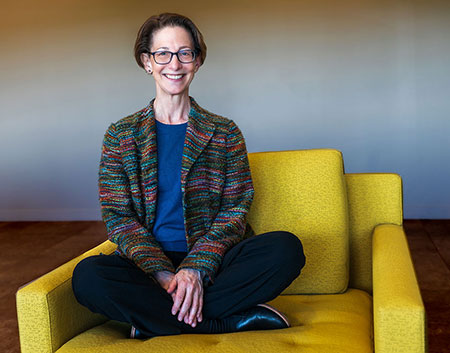
Dumont said she tries to think two or three steps ahead. A young campus like this can move more nimbly than established institutions. She wants to help take advantage of that.
“We don’t have a lot of institutional memory. We’re still trying to cement a structure,” she said. “What can we do to help set up UC Merced for where we want to be in 20 years? We want faculty to be productive, enthusiastic and creative researchers and scholars. What can I do to help them get there?”
Muñoz added: “I am confident UC Merced’s instructional and research endeavors will thrive with her compassionate and insightful stewardship,” Muñoz said.
A longtime colleague sees Dumont from a unique point of view. Katherine Newman was the provost at UMass when Dumont was a vice provost. Six years after Dumont came to UC Merced, Newman also came west. The alumna of UC San Diego and UC Berkeley is now UC provost and executive vice president of academic affairs.
“I am delighted to have this opportunity to work with Betsy once again,” Newman said. “She will be an incredible asset to the Merced campus and to her fellow provosts.”
Dumont called it the Taj Ma-Shed. Her husband laughed. Construction continued.
Today, the building known as Quail Bell Cottage is a cherished jewel for travelers to and from Yosemite. Airbnb, the vacation-space brokering website, rates Sean Werle a “super-host;” reviews average 4.99 out of 5 for the cottage and its full kitchen, cozy patio and electric vehicle charger.
Werle and Dumont live in Catheys Valley, a 30-minute drive northeast of UC Merced and a bit more than an hour to Yosemite National Park. Wild animals roam in and around the property. The couple maintains an owl roost and a “bat box” that can house up to 150 winged critters at a time.
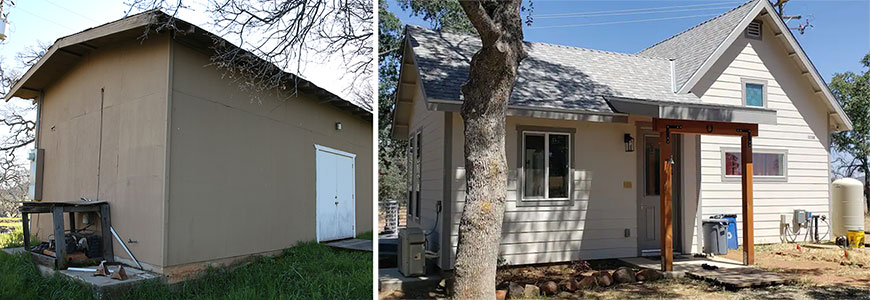
Quail Bell is the property’s centerpiece (even for Dumont, pre-construction misgivings notwithstanding). When they moved in, the outbuilding was a battered remnant of what a former owner used as a butcher shop. Half of the 32-by-16-foot structure was a meat freezer.
Werle, an organismic biologist, U.S. Coast Guard veteran and longtime (and long retired) professional scuba diver, saw something far more. He hired a local contractor and used funds from an ATM maintenance/ownership business he ran in Massachusetts. The result? Honestly, words don’t do it justice.
Well, these words are pretty fun: “We truly enjoyed meeting and talking with the hosts, Sean and Betsy,” a lodger posted on Airbnb. “Both are scientists with fascinating career stories.”
As for his wife’s new job, Werle expects more good reviews. “I think her favorite part is when she is able to solve a problem in a way that serves everyone involved.
“She thinks carefully about things. I’m not that way. I just wing it.”
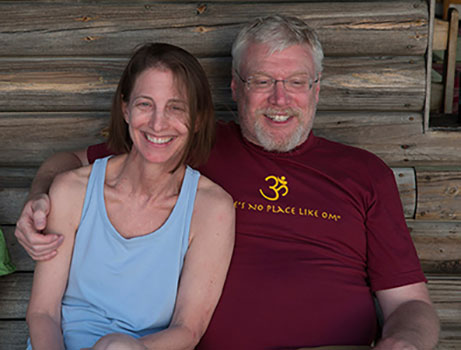
Speaking of wings, Dumont’s fascination with bats was triggered by bone and skin laid out in some wooden trays. It was the mid-’90s. She was a teaching fellow at the University of Pittsburgh with a Ph.D. in physical anthropology, seeking inspiration by poking around the mammal collection at the Carnegie Museum of Natural History.
She came across a tray of bat specimens from a tropical region comprised mostly of Central and South America. She gazed at the delicate bones, the skulls and teeth. Her eyes grew wide.
“Here were all these animals very closely related to each other, but their anatomy was so different, especially the skulls,” she said. “My mind was blown.”
She dove into published studies of these bats. She learned their disparate skull designs seemed tied to their environment. What did they eat and how did they eat it? That led to a series of papers on the spectrum of tooth design and salivary chemistry (“bat spit,” Dumont said). By then she was a professor at UMass. She went deeper, pushing into eating behavior and bite force, which meant she had to measure how their little bodies moved.
“So I went down the hall to the engineering department and said, ‘Hi, I’m Betsy from the biology department. Look at these cool things.’”
An engineering professor helped her take digital measurements of stress and strain linked to how bats fed. Measuring bite strength wasn’t too hard as the little creatures were all too motivated to chomp on a device held at their faces.
“So you measure that for a bunch of different species and then look at the relationship between bite force, anatomy, body size and ecology.”
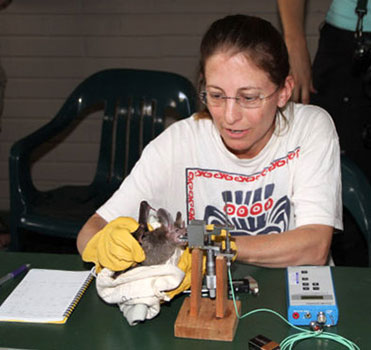
Because bat species comprise 20 percent of all mammals and have the same geographic range as humans, what we learn about these flying creatures can tell things about us.
“It was like pulling a thread, right? Putting together, in my own narrow way, a very big view of what these animals are,” Dumont said.
Pull on another thread and trace the university professor back to a girl exploring the greenbelt near her home in Oak Ridge, Tenn. The self-described tomboy was in her element in the woods. “My favorite things to do were run around and turn over rocks and find salamanders, to catch crawdads and climb trees and build forts,” Dumont said.
Her parents nurtured the girl’s love of nature and beauty. Her mother taught art in high school and her father was a biologist at Oak Ridge National Laboratory.
In college, she earned undergraduate and graduate degrees in anthropology, mostly studying human and primate evolution. But it wasn’t until that epiphany in the Carnegie museum’s mammal room that she leaned hard into evolutionary biology.
“I recreated myself as a bat biologist,” she said. “I have worked with engineers, geneticists, developmental biologists – all kinds of people. But it took a long time for me to come into my own as a scientist.”
An arm unfurls, a graceful yet studious curve from shoulder to fingertips. It rises from her hip, is still for a few measured seconds, and then returns smoothly to her side.
It’s a Monday night in February and Dumont is at the barre, joining six women warming up for an adult ballet session at the Merced Academy of Dance.
She and her classmates face left in the small, softly lit studio, one hand on the wooden railing. They stretch, extend, then turn right and repeat.
During a brief rest, Dumont smiles and chats with classmates. She takes a swig from a water bottle. Then it’s back to preparing for more than an hour of exacting, strenuous movements.
“It’s the best break from all the other stuff in my brain,” she said of ballet. “I’m focusing so hard on my ankle, my elbow, my neck being in the right place.
“It's a little bit of a respite.”
A classmate, Professor Katie Brokaw, has a relationship with ballet similar to Dumont’s. Both danced in their youth. Both set it aside for years. Then it came back. For Dumont, it was an adult class at a studio in Amherst. For Brokaw, it was COVID (she danced at home, connected to others by video).
“The wonderful thing about Betsy is she loves it so much,” said Brokaw.
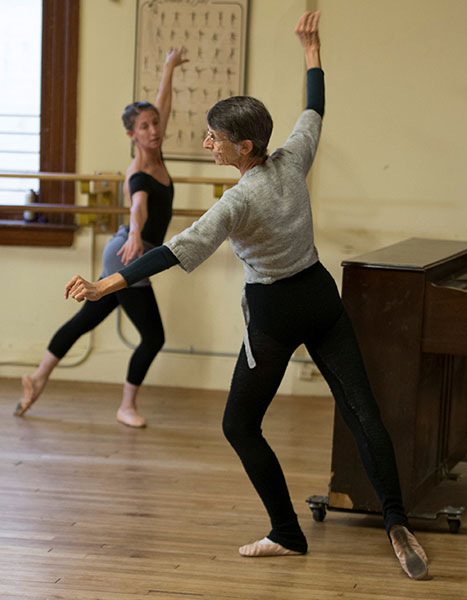
Another classmate, Nicole Ekblom, also danced as a girl. Her daughter attends the Merced academy. Dumont and Ekblom, co-owner of a veterinary clinic and a vet for large animals, share an affinity for animal science and running a business. The two have come to dance regularly since the class started about six years ago. Dumont rarely misses a session.
“I see her showing up every week,” Ekblom said. “That makes me want to show up as well.”
“She’s a pretty dancer,” Brokaw said of Dumont. “Her technique is so graceful.”
UC Merced’s new provost slips on the ballet shoes twice a week, warms up, leaps and swings and twirls. Determining what her body still can do. Setting aside the world outside, if only for a short time. Striving for a few moments of, well, not perfection. But close enough.
“If you happen to get something just right, it feels so good,” Dumont said. “You get that two seconds of feeling amazing.”